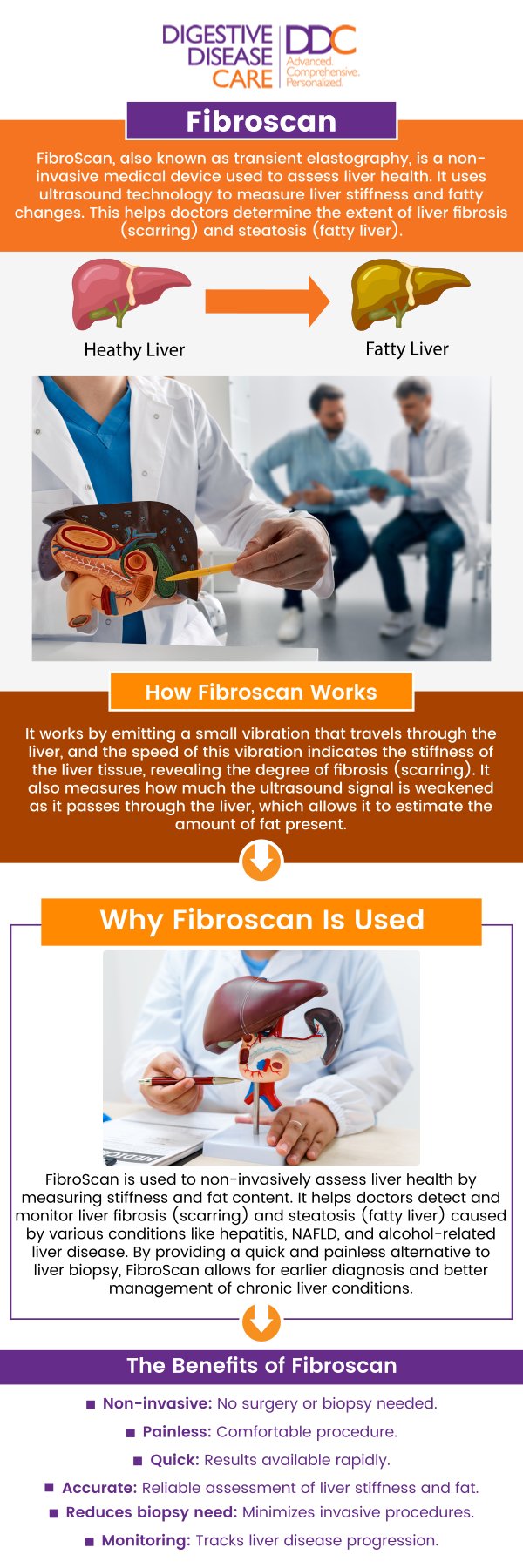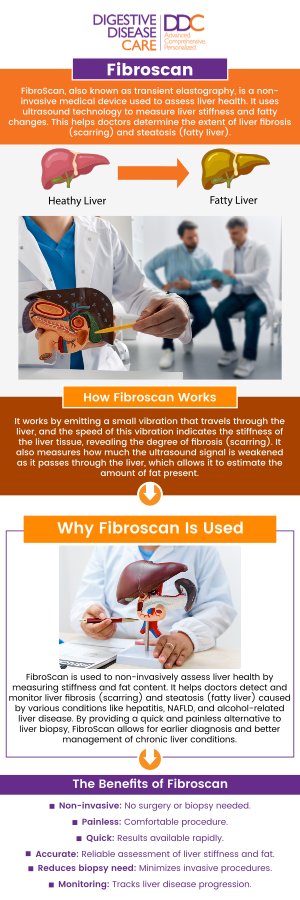What Are the Stages of Liver Fibrosis?
The stages of liver fibrosis range from mild scarring to advanced cirrhosis, with increasing impact on liver function as the condition progresses. Early stages may be reversible, while later stages often lead to permanent damage. At Digestive Disease Care, our board-certified gastroenterologists provide accurate diagnoses and treatment plans to manage every stage effectively. For more information, contact us today or schedule an appointment online. We have convenient locations to serve you in Babylon NY, East Setauket NY, Forest Hills NY, Jericho NY, Lake Success NY, Melville NY, Mineola NY, Massapequa NY, New Hyde Park NY, and Riverhead NY.


Table of Contents:
What are the stages of liver fibrosis?
How fast does liver fibrosis progress?
How are the stages of liver fibrosis diagnosed?
Can liver fibrosis be reversed?
Liver fibrosis develops gradually as healthy liver tissue is replaced by scar tissue due to chronic injury or inflammation. Understanding its stages is important because the severity of fibrosis helps determine the risk of complications and guides treatment decisions.
The stages of liver fibrosis include:
• Stage F0: No fibrosis; the liver is healthy with no scarring.
• Stage F1: Mild fibrosis; minimal scar tissue is present, usually around blood vessels, but liver function is not significantly affected.
• Stage F2: Moderate fibrosis; scarring extends into nearby liver tissue, beginning to interfere with normal liver structure.
• Stage F3: Severe fibrosis; bridging fibrosis develops, where bands of scar tissue connect different areas of the liver, causing greater impairment.
• Stage F4: Cirrhosis; extensive scarring leads to permanent damage, severely reduced liver function, and a higher risk of complications like liver failure or cancer.
Detecting fibrosis in its earlier stages offers the best chance to slow, stop, or even reverse damage. With proper management and treatment of the underlying cause, patients can often preserve liver function and reduce the risk of progression to cirrhosis.
Liver fibrosis progression varies widely from person to person and depends on the underlying cause, lifestyle factors, and overall health. Some individuals may experience slow changes over decades, while others progress more quickly, especially if the liver continues to face ongoing injury. Understanding these factors can help in monitoring and slowing the disease.
Key points about the progression of liver fibrosis include:
• The rate of progression depends on the cause, such as viral hepatitis, alcohol use, or fatty liver disease.
• Heavy alcohol use, chronic viral infections, and obesity can accelerate fibrosis.
• Genetics and coexisting health conditions, such as diabetes, may influence the speed of progression.
• Fibrosis can remain stable for years if the underlying cause is treated or managed.
• Without intervention, fibrosis can progress to cirrhosis (stage F4) over 10–20 years in some cases, though it may occur faster in high-risk individuals.
• Lifestyle changes, stopping alcohol, and medical treatment can significantly slow or even reverse early-stage fibrosis.
Because progression is unpredictable, regular monitoring and early treatment are essential. Timely medical care can help preserve liver function and prevent complications related to advanced liver disease.
Diagnosing the stages of liver fibrosis is essential for determining the extent of liver damage and guiding appropriate treatment. Since fibrosis often develops silently without symptoms, doctors rely on specialized tests and evaluations to identify its severity and progression.
Key methods used to diagnose the stages of liver fibrosis include:
• Medical history and risk assessment: Evaluating alcohol use, viral hepatitis, fatty liver disease, or other risk factors.
• Blood tests: Checking liver enzymes, proteins, and fibrosis markers (such as FIB-4 or APRI scores) that estimate fibrosis stage.
• Imaging tests: Ultrasound, CT scans, or MRI to assess liver texture and detect complications.
• Transient elastography (FibroScan): A non-invasive test that measures liver stiffness, correlating with fibrosis severity.
• Specialized blood panels: Biomarker-based tests that provide additional information on scarring.
• Liver biopsy: The most definitive method, involving microscopic examination of liver tissue to determine the exact stage (F0–F4).
By combining test results with clinical evaluation, physicians can accurately stage liver fibrosis and recommend the best course of treatment. Early diagnosis is critical, as it allows for interventions that may slow, stop, or even reverse progression.
Liver fibrosis, the buildup of scar tissue due to chronic liver injury, was once thought to be permanent. However, research now shows that fibrosis can often be slowed, halted, or even reversed if the underlying cause is treated early. The chances of reversal depend on how advanced the fibrosis is and how quickly intervention begins.
Key points about reversing liver fibrosis include:
• Early stages (F1–F2): Fibrosis is often reversible when the cause—such as alcohol use, hepatitis, or fatty liver disease—is treated.
• Advanced stages (F3–F4): Reversal is more difficult; cirrhosis (F4) usually cannot be fully reversed, but progression can be slowed.
• Alcohol cessation: Stopping alcohol use can significantly improve or reverse alcohol-related fibrosis.
• Managing underlying conditions: Treating viral hepatitis, obesity, diabetes, or fatty liver disease can reduce scarring.
• Lifestyle changes: A healthy diet, weight control, and exercise support liver recovery.
• Medications and therapies: Some newer treatments target fibrosis directly, though options vary by cause.
• Ongoing monitoring: Regular follow-ups help track liver improvement and prevent relapse.
While reversal is most likely in earlier stages, proactive management greatly improves liver health and reduces the risk of cirrhosis or liver failure. For more information, contact us today or schedule an appointment online. We have convenient locations to serve you in Babylon NY, East Setauket NY, Forest Hills NY, Jericho NY, Lake Success NY, Melville NY, Mineola NY, Massapequa NY, New Hyde Park NY, and Riverhead NY and surrounding areas.

Check Out Our 5 Star Reviews


Additional Services You May Like

Additional Services You May Like
- Abdominal Pain
- Acid Reflux
- Barretts Esophagus
- Bloating
- Capsule Endoscopy
- Celiac Disease
- Colon Cancer Screening
- Colonoscopy
- Constipation
- Crohns Disease
- Diarrhea
- Diverticulitis
- Esophageal PH Monitoring
- Fatty Liver
- Fibroscan
- Gallstones
- Gastroenterologist
- Gastric Chest Pain
- Gluten Intolerance
- Hemorrhoid
- Hemorrhoid Banding
- Hepatitis
- Irritable Bowel Syndrome
- Lactose Intolerance
- Pancreatitis
- Polyps
- Rectal Bleeding
- Stomach
- Ulcerative Colitis
- GI Urgent Care





